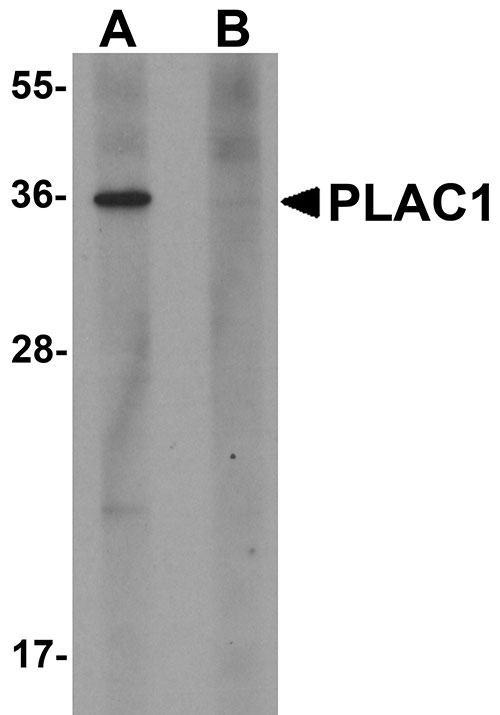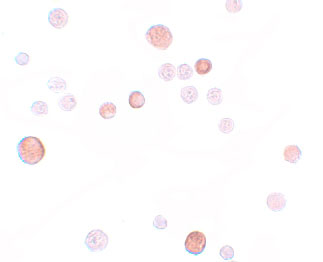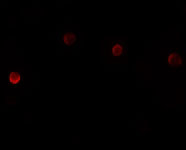PLAC1 Antibody
- SPECIFICATION
- CITATIONS
- PROTOCOLS
- BACKGROUND

Application
| WB, IF, ICC, E |
|---|---|
| Primary Accession | Q9HBJ0 |
| Other Accession | NP_068568, 11496283 |
| Reactivity | Human |
| Host | Rabbit |
| Clonality | Polyclonal |
| Isotype | IgG |
| Calculated MW | 23616 Da |
| Application Notes | PLAC1 antibody can be used for detection of PLAC1 by Western blot at 1 µg/mL. Antibody can also be used for immunocytochemistry starting at 10 µg/mL. For immunofluorescence start at 20 µg/mL. |
| Gene ID | 10761 |
|---|---|
| Target/Specificity | PLAC1; |
| Reconstitution & Storage | PLAC1 antibody can be stored at 4℃ for three months and -20℃, stable for up to one year. As with all antibodies care should be taken to avoid repeated freeze thaw cycles. Antibodies should not be exposed to prolonged high temperatures. |
| Precautions | PLAC1 Antibody is for research use only and not for use in diagnostic or therapeutic procedures. |
| Name | PLAC1 {ECO:0000312|EMBL:AAG22596.1} |
|---|---|
| Function | May play a role in placental development. |
| Cellular Location | Secreted. |
| Tissue Location | Expressed in placenta. Localizes primarily to differentiated syncytiotrophoblast throughout gestation as well as to a small population of villous cytotrophoblasts. Also detected in maternal blood and rapidly disappears following delivery, but is not detected in other adult or fetal tissues examined. |

Thousands of laboratories across the world have published research that depended on the performance of antibodies from Abcepta to advance their research. Check out links to articles that cite our products in major peer-reviewed journals, organized by research category.
info@abcepta.com, and receive a free "I Love Antibodies" mug.
Provided below are standard protocols that you may find useful for product applications.
Background
PLAC1 Antibody: PLAC1 was initially identified as a protein expressed specifically in the placenta and other cells derived from the trophoblast lineage during embryonic development, but has also been found to be expressed ectopically in a wide range of human malignancies, particularly breast cancers. PLAC1 is a membrane-associated protein that is thought to serve a receptor-like function modulating cell-cell or ligand receptor interactions unique to the maternal-placental interface. Decreased expression of PLAC1 is associated with decreased expression of cyclin D1 and reduced expression of AKT kinase, which, combined with the fact that PLAC1 is expressed on the surface of cancer cells, suggests that PLAC1 may be an effective candidate for immunotherapeutic treatments of cancer.
References
Cocchia M, Humber R, Pantano S, et al. PLAC1, an Xq26 gene with placenta-specific expression. Genomics2000; 68:305-12.
Koslowski M, Sahin U, Mitnacht-Kraus R, et al. A placenta-specific gene ectopically activated in many human cancers is essentially involved in malignant cell processes. Cancer Res.2007; 67:9528-34.
Fant M, Weisoly DL, Cocchia M, et al. PLAC1, a trophoblast-specific gene, is expressed throughout pregnancy in the human placenta and modulated by keratinocyte growth factor. Mol. Reprod. Dev.2002; 63:430-6.
If you have used an Abcepta product and would like to share how it has performed, please click on the "Submit Review" button and provide the requested information. Our staff will examine and post your review and contact you if needed.
If you have any additional inquiries please email technical services at tech@abcepta.com.













 Foundational characteristics of cancer include proliferation, angiogenesis, migration, evasion of apoptosis, and cellular immortality. Find key markers for these cellular processes and antibodies to detect them.
Foundational characteristics of cancer include proliferation, angiogenesis, migration, evasion of apoptosis, and cellular immortality. Find key markers for these cellular processes and antibodies to detect them. The SUMOplot™ Analysis Program predicts and scores sumoylation sites in your protein. SUMOylation is a post-translational modification involved in various cellular processes, such as nuclear-cytosolic transport, transcriptional regulation, apoptosis, protein stability, response to stress, and progression through the cell cycle.
The SUMOplot™ Analysis Program predicts and scores sumoylation sites in your protein. SUMOylation is a post-translational modification involved in various cellular processes, such as nuclear-cytosolic transport, transcriptional regulation, apoptosis, protein stability, response to stress, and progression through the cell cycle. The Autophagy Receptor Motif Plotter predicts and scores autophagy receptor binding sites in your protein. Identifying proteins connected to this pathway is critical to understanding the role of autophagy in physiological as well as pathological processes such as development, differentiation, neurodegenerative diseases, stress, infection, and cancer.
The Autophagy Receptor Motif Plotter predicts and scores autophagy receptor binding sites in your protein. Identifying proteins connected to this pathway is critical to understanding the role of autophagy in physiological as well as pathological processes such as development, differentiation, neurodegenerative diseases, stress, infection, and cancer.




